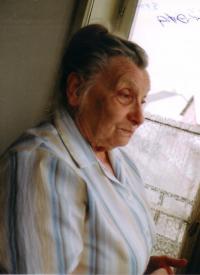"A lot of people from the central Bohemia have moved here with the intention to get a job in farming. But it wasn’t probably that good back then, so my grandpa worked as a carpenter instead and they lived in a carpenter’s house among the colony.
In 1938, when the Germans occupied everything here, many of the local people who worked as the coal miners or those who could take their job for granted, didn’t leave. They decided to stay here. They’ve been given the opportunity to leave if they wanted to. Or people who didn’t really care about going away were asked to leave. At first, there was a promise of Czech schools here, but once the Germans came, there was no vision of Czech school anymore. I was suffering the scarlet fever and the diphtheria in the mean time, so the German doctor didn’t allow us to go anywhere, to prevent the contamination. Therefore we stayed here until the Germans occupied everything. I’m not sure when it was; in September or in November we walked to Kladno town. We loaded all our belongings up on the wagon and off we went. We, the kids, didn’t know where we were going. I understand how our parents must have felt, they were just miserable. You know, if you have a roof to sleep under, even if it’s only a shed, its home. The first town we got to was Louny. There I ate the hot dog for the first time. From there we continued to Prague then. It was night already when we sat at the train station. We didn’t know which carrier was ours and there was one rail man who offered us to spend the night at his house. After that we never saw him anymore. It was somewhere close to the main train station in Prague. Then we went to Stránčice village, where my father has been transferred. I went to the local school there for about three days.
And then there was my grandpa too. He used to have relatives who lived in Kladno town. One day we went there to visit them and after they found out how we live, they invited us to stay with them. We stayed with them for about six weeks before we found something else for us: some people in Kladno had this big garden and they had a laundry house there. So they let us stay there. It was awful there, but then our parents managed to find one separate bedroom for all of us. We stayed there until the end of the war and then we returned back here, even though our parents didn’t really wanted to...Because there (in Kladno) we lived with Czechs, not Germans like here.
I remember, in Kladno, on my way to school, I was going through the place from where I could see Slaný town and I could also see the Milešovka hill. I was thinking to myself: That’s where my home is-far away there is my home, over the Milešovka Mountain. I never quite familiarized with Kladno, so I remember walking these paths and I do understand how bad the Germans must have felt-how one can miss his hometown; despite the fact that I lived there with my parents. When your parents are, that’s where your home is. But I can understand if someone feels like that.
But they were really mean to us, you know, in 1938 when the Germans took over everything here. They used to do all kinds of bad things. For an example, when the men got out back to the surface at 10 pm, the Germans waited outside for them. They made a narrow corridor and as the men were walking through it they were beating them. Or they would break into the houses where Czech people lived, they broke their windows and then they got in and beat the people inside. My grandma used to live in a house with the porch. My mom’s brother who returned from the mobilization also lived there. The Germans knew there was a young man living in this house so they broke in, but my uncle hid himself up on the roof behind the chimney. Fortunately there used to be very substantial door, so the Germans could get in. My grandma was standing behind that door screaming: ´People, Czech people come and help us, or they will kill us.´ I know it was awful, but they say-it’s the power of the crowd...
Now, as I hear what is going on here and there I think to myself: how can something as bead as this happen... I remember one of our neighbors. I won’t mention his name, because his family still lives here. He became an Ordner (the security person) over night. Many of the people we used to meet every day were Germans. I can’t say that we lived in permanent enmity. But there was something like a barrier between us here - you are you, and we are we."

